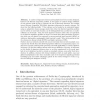Free Online Productivity Tools
i2Speak
i2Symbol
i2OCR
iTex2Img
iWeb2Print
iWeb2Shot
i2Type
iPdf2Split
iPdf2Merge
i2Bopomofo
i2Arabic
i2Style
i2Image
i2PDF
iLatex2Rtf
Sci2ools
PKC
2000
Springer
2000
Springer
Design Validations for Discrete Logarithm Based Signature Schemes
A number of signature schemes and standards have been recently designed, based on the Discrete Logarithm problem. In this paper we conduct design validation of such schemes while trying to minimize the use of ideal hash functions. We consider Discrete Logarithm (DSA-like) signatures abstracted as generic schemes. We show that the following holds: "if the schemes can be broken by an existential forgery using an adaptively chosen-message attack then either the discrete logarithm problem can be solved, or some hash function can be distinguished from an ideal one, or multicollisions can be found." Thus, for these signature schemes, either they are equivalent to the discrete logarithm problem or there is an attack that takes advantage of properties which are not desired (or expected) in strong practical hash functions (SHA-1 or whichever high quality cryptographic hash function is used). What is interesting is that the schemes we discuss include KCDSA and slight variations of DSA....
Related Content
| Added | 25 Aug 2010 |
| Updated | 25 Aug 2010 |
| Type | Conference |
| Year | 2000 |
| Where | PKC |
| Authors | Ernest F. Brickell, David Pointcheval, Serge Vaudenay, Moti Yung |
Comments (0)

